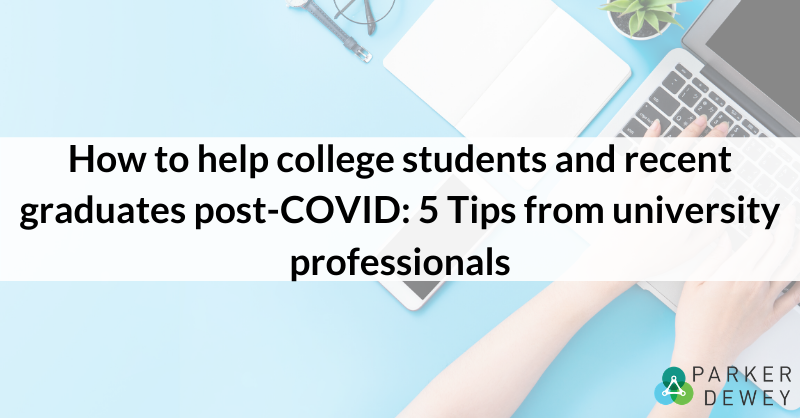.png)
Anxious about fall recruiting?
While university recruiters are always anxious this time of year, for many, this year will have more uncertainty (and risk) than ever.
Will you reach students beyond the "traditional" focus schools? Will the candidate pool and hires achieve your diversity goals? Will others at your company be satisfied with the results?
Instead of hoping that traditional recruiting tools will work during this untraditional year, early-career teams can use Micro-Internships as part of their campus recruiting process to minimize these risks. Not only does the data show better engagement, diversity, and conversion outcomes—this form of experiential recruiting drives a 40-48% lower cost per hire, less wasted time, and happier hiring managers.
As we’ve heard from university recruiters during the past six years, Micro-Internships helped them:
- “Engage students who weren’t thinking about our company or industry”
- “Engage students at schools we don’t visit”
- “Improve the diversity of my applicant pool, and my hires “
- “Lower my costs by 60%, and improve our conversion rate by 3x”
- “Connect to students we're missing" (Like first-generation, student workers, student-athletes, etc.)
- “Spend less time flipping through resume books and conducting phone screens”
If you’ve hosted a Micro-Internship, how have they helped you in the recruiting process or with your day-to-day responsibilities? Send me an email—I’d love to hear your thoughts.
Jeffrey Moss, Founder and CEO
Articles of the Week
New Research on High-Volume Hiring Reveals Broad Misconceptions and Bad Practices - ERE
National Survey of College Internships (NSCI) 2021 Report - Center for Research on College-Workforce Transitions, University of Wisconsin-Madison
The old-fashioned resume may no longer be the tool for hiring a more diverse team - CNBC
New Research on High-Volume Hiring Reveals Broad Misconceptions and Bad Practices - ERE
“Unlike in traditional corporate hiring, high-volume needs are extremely time-sensitive with speed defining success. What’s more, over the past year, high-volume hiring intensified as many companies were forced to reduce time to fill from several weeks to several days. Unfortunately, though, the result was usually time-consuming and ineffective.”
Aptitude Research reports that 65% of companies have high-volume recruitment needs right now—and that number is only likely to increase in the current labor market. This article breaks down Aptitude’s study on high-volume recruitment, plus key recommendations for companies at any stage of the process. One solution for high-volume challenges: short-term, paid, professional assignments. With Micro-Internships, you can access our network open to more than 11-million degree-earners— then engage and assess quickly.
Related reading: Our Network
National Survey of College Internships (NSCI) 2021 Report - Center for Research on College-Workforce Transitions, University of Wisconsin-Madison
“As college students graduate into a labor market rife with uncertainty and rapidly changing conditions caused by the COVID-19 pandemic, the potentially transformative experience offered by a high-quality internship may become even more important. It is therefore incumbent that the higher education community improve how these programs are designed and implemented, and that they are made available to all students regardless of race, socio-economic status, and geographic location.”
In this 14-campus study, researchers from the Center for Research on College-Workforce Transitions examined the “inter-connected issues of limited data and concerns about inequality” in the internship landscape across the United States. One of the nine key findings reveals that 67% of students in study “had wanted to take an internship but could not due to a variety of obstacles, thus revealing a considerable issue with equitable access.” Check out the full study for more data points on barriers to internship access. (Many of the challenges presented within the study, however, are solvable with tools like Micro-Internships that can create more equitable pathways!)
Related reading: On Harnessing the Power of Remote Work
The old-fashioned resume may no longer be the tool for hiring a more diverse team - CNBC
“Resumes...have become increasingly redundant as recruiters look for certain things and these shortcuts become a breeding ground for biases.”
Traditional recruiting tools like resumes (blinded or not) and even emerging practices like AI algorithms aren’t solving the challenges associated with creating equitable pathways. This is especially important when it comes to recruiting college students for internships and full-time roles. As we’ve seen at Parker Dewey has seen, experiential recruiting tools like Micro-Internships help employers enhance diversity in an authentic way, while also improving other hiring outcomes.
Related reading: Virtual Internships Allow Hiring Assessments to Evolve
Calling all early-career professionals!
Do you recruit, hire, or work with early-career professionals? Become a contributor to our expert network and provide advice to college students and recent graduates nationwide!
Each month, we ask our network of career launchers (open to 11+ million degree-earners!) for their burning questions about getting hired, what recruiters are looking for, and general advice from hiring managers and recruiters.
For more stories and insights on HR, recruiting, and diversity, click here to subscribe to our weekly newsletter Hire Learnings.





